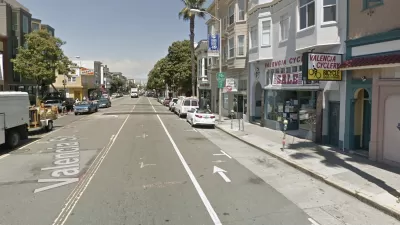That's how two San Francisco Chronicle reporters are painting the loss of 591 parking spaces to bike lanes, parklets, and bus rapid transit this year, after losing 180 downtown spaces last year. Streetsblog's Aaron Bialick responds.
Should parking spaces in San Francisco be put on the endangered list? You might think so from reading the May 31 column by Phil Matier and Matier & Andrew Ross.
From the Financial District to the Fillmore, parking spaces along San Francisco’s streets are vanishing at unprecedented numbers — and for those who drive, the situation is only going to get worse.
Bialick makes some quick observations:
- Parking spaces aren't lost - they are repurposed.
- After doing the math, he shows the amount to be "less than 0.5 percent of its curbside parking spaces."
- The result of the repurposed spaces is that these "areas poised to get safer streets and better transit."
That last bullet isn't lost on Matier & Ross. After interviewing San Francisco Municipal Transportation Agency (SMFTA) spokesman Paul Rose, they write that "the city remakes its streets to make them more pedestrian-, bike- and bus-friendly." In fact, it's nice to read that they categorize the loss of parking spaces for bike lanes and BRT as "traffic improvements." That leaves one remaining parking slayer: parklets.
(T)hey take up two parking spaces each, often in commercial sections of neighborhoods where parking is at a premium.
The city has installed 51 parklets around the city to date, with most going up outside of restaurants. That means the loss of 102 spaces — and there are roughly 24 parklets in the pipeline for approval at the Planning Departme.
The 150 spaces is about 9 percent of the 1,600 spaces scheduled to be removed, or .05 percent of the city total. "As for those of us who still search for parking?" they ask.
“Better organizing our streets will mean more people taking transit, biking or walking, so there will be less people to drive and park, making more space on the road for everyone,” Rose said.
The columnists don't buy it. Matier takes the motorists' perspective on a local radio show. Fortunately, Bialick critiques it in his column.
FULL STORY: Phil Matier’s Shameless Bid to Drum Up Resentment About Parking

Alabama: Trump Terminates Settlements for Black Communities Harmed By Raw Sewage
Trump deemed the landmark civil rights agreement “illegal DEI and environmental justice policy.”

Study: Maui’s Plan to Convert Vacation Rentals to Long-Term Housing Could Cause Nearly $1 Billion Economic Loss
The plan would reduce visitor accommodation by 25% resulting in 1,900 jobs lost.

Planetizen Federal Action Tracker
A weekly monitor of how Trump’s orders and actions are impacting planners and planning in America.

Waymo Gets Permission to Map SF’s Market Street
If allowed to operate on the traffic-restricted street, Waymo’s autonomous taxis would have a leg up over ride-hailing competitors — and counter the city’s efforts to grow bike and pedestrian on the thoroughfare.

Parklet Symposium Highlights the Success of Shared Spaces
Parklets got a boost during the Covid-19 pandemic, when the concept was translated to outdoor dining programs that offered restaurants a lifeline during the shutdown.

Federal Homelessness Agency Places Entire Staff on Leave
The U.S. Interagency Council on Homelessness is the only federal agency dedicated to preventing and ending homelessness.
Urban Design for Planners 1: Software Tools
This six-course series explores essential urban design concepts using open source software and equips planners with the tools they need to participate fully in the urban design process.
Planning for Universal Design
Learn the tools for implementing Universal Design in planning regulations.
Caltrans
Smith Gee Studio
Institute for Housing and Urban Development Studies (IHS)
City of Grandview
Harvard GSD Executive Education
Toledo-Lucas County Plan Commissions
Salt Lake City
NYU Wagner Graduate School of Public Service





























